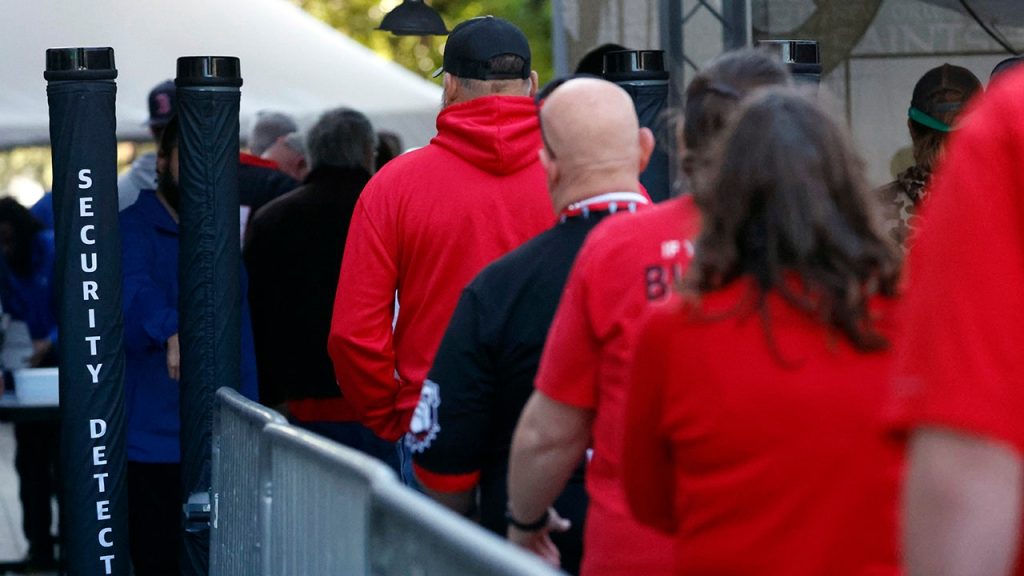The Caesars Superdome in New Orleans buzzed with activity on Thursday afternoon as college football fans, eager to witness the Sugar Bowl matchup between Georgia and Notre Dame, streamed into the stadium. The game, originally scheduled for New Year’s Day, had been postponed following a devastating terror attack on Bourbon Street in the early hours of January 1st. A truck, driven by Shamsud-Din Jabbar, plowed into a crowd of revelers, leaving more than a dozen dead and several others injured. The horrific incident cast a pall over the city and forced officials to reschedule the highly anticipated game. Despite the tragedy and the disruption to their plans, fans remained resolute in their desire to experience the Sugar Bowl. While some individuals opted to return home, many others persevered, making their way to the Superdome grounds, patiently navigating security checkpoints in anticipation of the delayed kickoff.
The city of New Orleans, still reeling from the attack, worked diligently to restore a sense of normalcy and ensure the safety of residents and visitors alike. Authorities reopened Bourbon Street just hours before the rescheduled game, a symbolic gesture of resilience in the face of adversity. Louisiana Governor Jeff Landry, emphasizing the heightened security measures in place, reassured the public about the safety of attending the game. He expressed confidence in the comprehensive security arrangements implemented at the Superdome, highlighting the ongoing support and resources provided by the FBI. His presence at the game further underscored the state’s commitment to both honoring the victims and moving forward with the much-anticipated sporting event.
Sugar Bowl officials, adapting to the extraordinary circumstances, announced a revised schedule for the pregame festivities. The pageantry, including the national anthem, a captivating Sugar Bowl light show, and performances by the marching bands of both Georgia and Notre Dame, was set to commence at 2:15 p.m. CT, with the game kicking off at 3 p.m. CT. This adjusted timeline allowed for the necessary security measures and provided ample time for fans to enter the stadium and settle in. The resilience of the organizers and the enthusiasm of the fans demonstrated a collective determination to celebrate the spirit of college football while acknowledging the solemnity of the recent tragedy.
The decision to postpone and subsequently reschedule the Sugar Bowl was met with widespread understanding and support. SEC Commissioner Greg Sankey expressed his shock and sorrow over the New Year’s Day attack, while simultaneously acknowledging the tremendous efforts undertaken by numerous individuals and organizations to make the rescheduled game possible. He praised the adaptability and dedication of all involved, recognizing the importance of providing a sense of continuity and normalcy for the players, fans, and the city of New Orleans. The rescheduling of the game represented a testament to the human capacity to persevere in the face of adversity, finding solace and strength in shared experiences.
The Sugar Bowl, traditionally a vibrant celebration of college football, took on a different significance in 2024. The game became a symbol of resilience, a demonstration of the power of community, and a tribute to the victims of the tragic attack. While the shadow of the tragedy undoubtedly lingered, the game provided an opportunity for fans to unite, to celebrate the spirit of competition, and to reaffirm the importance of moving forward with hope and determination. The atmosphere in the Superdome, charged with both excitement and solemnity, reflected the complex emotions of the moment.
The rescheduled Sugar Bowl served as a poignant reminder that even in the face of unimaginable tragedy, the human spirit endures. The game became more than just a sporting event; it became a symbol of healing, resilience, and the enduring power of community. The images of fans filling the Superdome, cheering on their teams, and celebrating the spirit of college football, projected a powerful message of hope and resilience to a city and a nation grappling with the aftermath of a senseless act of violence. The game, in its own way, became a testament to the human capacity to overcome adversity, find strength in unity, and move forward with renewed determination.

